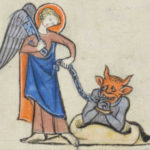We run our website the way we wished the whole internet worked: we provide high quality original content with no ads. We are funded solely by your direct support. Please consider supporting this project.
Everybody’s Got a Prequel
My wife and I, along with some friends, recently attended the Broadway Play Wicked. Without giving too much away, I’ll tell you the play attempts to answer the question: What could have possibly made the “Wicked Witch of the West” so [apparently] evil (as presented in the original Wizard of Oz)? After all, normal young ladies don’t just wake up one day and decide to find their enjoyment in tormenting poor Scare Crows, Tin Men, Cowardly Lions and little farm girls with their “mangy little dogs.”
Might it have something to do with the fact that she was born green?
By giving us “the rest of the story,” the play “Wicked” exposes how little we really knew about this “Wicked Witch” from the original Wizard of Oz and how shallow and misguided our initial judgments about her were. By giving us the “prequel” to her life, we’re moved toward compassion instead of judgment.
The fact is, all of us have a “prequel.” From the mass murderers to the terrorists to the pedophiles to the prostitutes to the gang members — and, yes, even to the gossipers, gluttons and judgers — there’s a story which, if we knew it well, would help explain why they are the way they are. People don’t just decide one day to be wicked. Things happen. There’s always a story to be told.
Does this mean that people aren’t morally accountable for their actions? Not at all. For we are not just products of our environment and genes. We make choices, for which we’re responsible. But it does mean that only God knows the extent of our moral accountability, which is why only he can legitimately judge another person (I Sam. 16:7).
Does this mean that society shouldn’t take strong measures to protect itself from murderers, pedophiles and the like? Of course not. For the good of the whole – and perhaps sometimes for their own good — some people must be locked away.
But followers of Jesus are called and empowered to go beyond the socially necessary judgments of society. We’re called to love all people at all times, including our enemies. We’re called to do good to those who do us harm. We’re called to believe the best and hope the best about everyone (I Cor. 13. 7), We’re called to regard our own sins, whatever they are, to be tree trunks in comparison to other peoples sins, whatever they are (Mt. 7.1-3).
We’re called to live in the mode of Jesus’ final prayer: “Father forgive them, they don’t know what they do.” (See the essay Living Jesus’ Prayer For Forgiveness). They may in fact know what they do, but that is not for us to decide. We are to leave all judgment to God (Rom. 12:19-21; Ja. 4:10-12). Our job is to hope for their forgiveness and agree with God that each and every person we see was worth God dying for. Each person has unsurpassable worth, regardless of what they do, and our job as followers of Christ is to show our agreement with this assessment by how we think, speak and act in relation to them.
So whether you end up seeing the play Wicked or not, have compassion on the Wicked Witch… and everyone like her. Prayerfully wonder what their “prequel” might look like, and pray for their forgiveness.
Category: General
Tags: Forgiveness, Judgement, Kingdom Living
Related Reading

Have You Taken a Gospel Immunization Shot?
Why does being “Christian” in America make so little difference in so many people’s lives, when the kingdom movement revealed in the New Testament revolutionized people’s lives? This drastic difference is hardly surprising when you consider that the gospel that people are often given today is little more than a contract of acquittal that is…

When the Gospel is Reduced to a Sinner’s Prayer
Jeff Clark posted an article recently entitled The Gospel of Sin Management and the Loss of Discipleship. We do violence to the gospel when we forget that we are called beyond a mere “sinner’s prayer” to a life of discipleship that imitates the life of Jesus. This might sound harsh, but it’s actually an integral…

The All-or-Nothing of Kingdom Living
Nothing is more central to the kingdom of God than agreeing with God about every person’s unsurpassable worth and reflecting this in how we act toward them. Nothing is more important that living in Christlike love for all people at all times. In fact, compared to love, nothing else really matters in the kingdom. In…

Podcast: How Does God Judge?
Greg looks at the revelation of how God judges as demonstrated on the cross. http://traffic.libsyn.com/askgregboyd/Episode_0089.mp3

Enemy Love
Rob Hogeslag via Compfight Zack Hunt over at The American Jesus shared the story of Paul Keane who offered his own burial plot to Tamerlan Tsarnaev if his family could not find a cemetery that would accept his body. You’ll remember that Tsarnaev was one of the men who carried out the Boston Marathon bombings and…

Kingdom Reconciliation is Not About Politics (But it is Political)
In the broader culture, the social and political discussions about racial reconciliation are usually focused on people’s rights and privileges as a means of making the world a fairer place. The criteria such efforts at reconciliation appeal to are common decency, fairness and reason. The enterprise is certainly necessary, and all decent, fair minded, rational…
